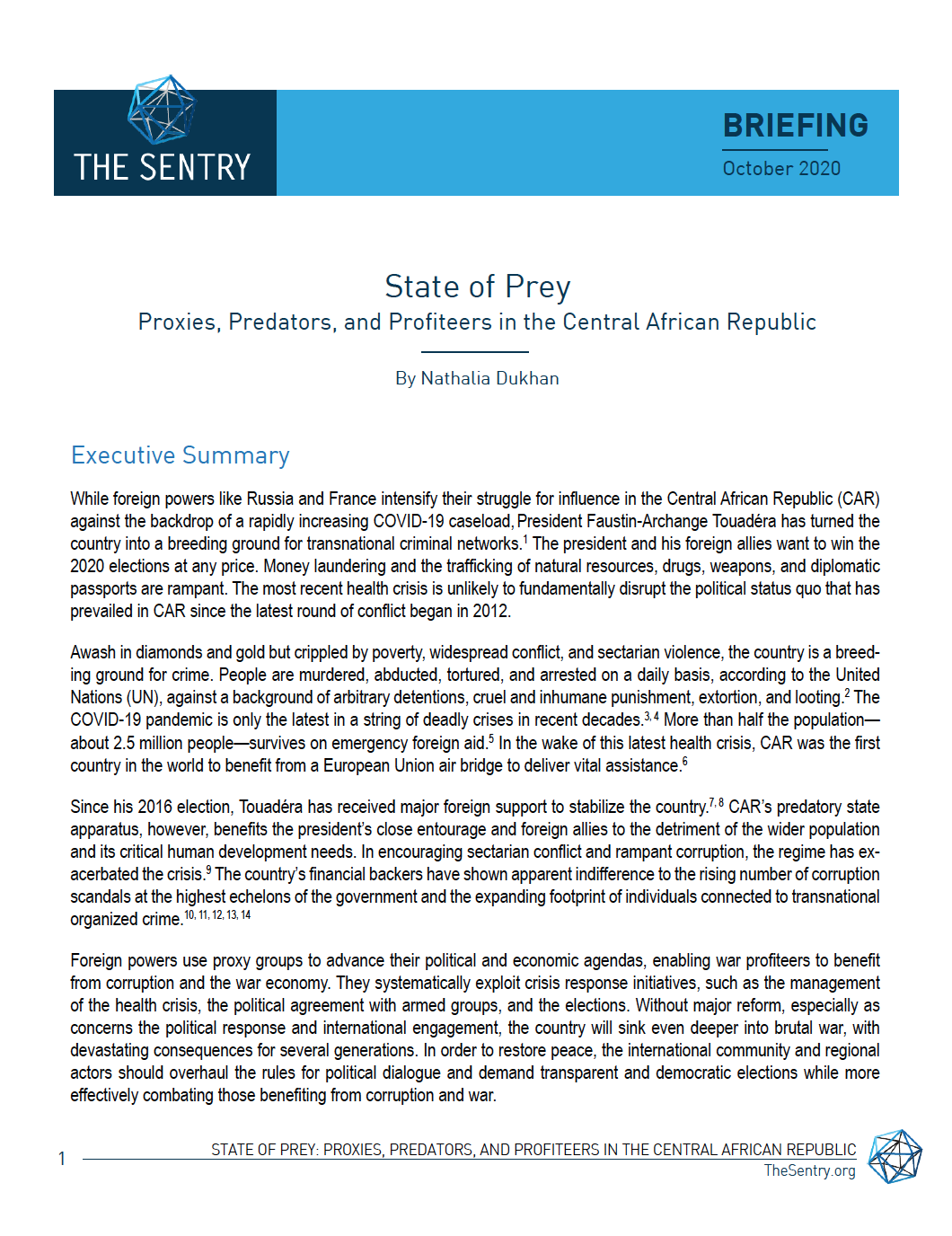 Download the full briefing.
Download the full briefing.
> Lire en français.
While foreign powers like Russia and France intensify their struggle for influence in the Central African Republic (CAR) against the backdrop of a rapidly increasing COVID-19 caseload, President Faustin-Archange Touadéra has turned the country into a breeding ground for transnational criminal networks.* The president and his foreign allies want to win the 2020 elections at any price. Money laundering and the trafficking of natural resources, drugs, weapons, and diplomatic passports are rampant. The most recent health crisis is unlikely to fundamentally disrupt the political status quo that has prevailed in CAR since the latest round of conflict began in 2012.
Awash in diamonds and gold but crippled by poverty, widespread conflict, and sectarian violence, the country is a breeding ground for crime. People are murdered, abducted, tortured, and arrested on a daily basis, according to the United Nations (UN), against a background of arbitrary detentions, cruel and inhumane punishment, extortion, and looting.* The COVID-19 pandemic is only the latest in a string of deadly crises in recent decades.* * More than half the population—about 2.5 million people—survives on emergency foreign aid.* In the wake of this latest health crisis, CAR was the first country in the world to benefit from a European Union air bridge to deliver vital assistance.*
“État de prédation”
Consulter en français.
Click here to view the video in French and Sango.
Since his 2016 election, Touadéra has received major foreign support to stabilize the country.* * CAR’s predatory state apparatus, however, benefits the president’s close entourage and foreign allies to the detriment of the wider population and its critical human development needs. In encouraging sectarian conflict and rampant corruption, the regime has exacerbated the crisis.* The country’s financial backers have shown apparent indifference to the rising number of corruption scandals at the highest echelons of the government and the expanding footprint of individuals connected to transnational organized crime.* * * * *
Foreign powers use proxy groups to advance their political and economic agendas, enabling war profiteers to benefit from corruption and the war economy. They systematically exploit crisis response initiatives, such as the management of the health crisis, the political agreement with armed groups, and the elections. Without major reform, especially as concerns the political response and international engagement, the country will sink even deeper into brutal war, with devastating consequences for several generations. In order to restore peace, the international community and regional actors should overhaul the rules for political dialogue and demand transparent and democratic elections while more effectively combating those benefiting from corruption and war.
Main Recommendations
In the wake of its investigation, The Sentry is making the following key recommendations, the full text of which appears at the end of this report.
UN Security Council, European Union, and their member states:
- End support for the implementation of the Khartoum accord. Stop political support of and financing for initiatives that fuel government corruption, the war economy, and impunity, such as aid meant to implement the Khartoum agreement. Instead, support an innovative process based on international, regional, and national dialogue in order to provide a framework for responding to the many challenges resulting from the proxy war.
- Ensure elections are effectively transparent and democratic. Ensure a vigorous audit of the entire electoral process by an independent body, hold the Central African government accountable, and secure the participation of civil society. If the elections are marred by major fraud, suspend recognition of the legitimacy of the future Central African government, shift funding priorities, and suspend budget support.
- Target entire networks that systematically destabilize crisis response initiatives and have links to transnational organized crime. Investigate and, where appropriate, impose targeted network sanctions on individuals and entities, with a focus on government officials and international facilitators connected to transnational organized crime networks.
- Effectively combat the trafficking of minerals from conflict zones in CAR. The EU should ensure the effective implementation of its new conflict minerals legislation, which comes into force in January 2021, with a focus on ending the trafficking of gold from Central African conflict zones to the EU. The UN Security Council should include concrete measures targeting the war economy and criminal networks in the mandate of the UN Multidimensional Integrated Stabilization Mission in the Central African Republic (MINUSCA).
- Prosecute economic and financial crimes. Support CAR’s Special Criminal Court, the International Criminal Court, and other national jurisdictions in investigating and prosecuting financial crimes.
Banks and financial institutions:
- Combat organized crime networks. Financial institutions operating in CAR or with affiliates in CAR should conduct enhanced monitoring for transactions involving transnational organized crime networks, particularly those with close ties to the natural resource sector, and submit suspicious activity reports to financial intelligence units as appropriate.
Download the full briefing.

